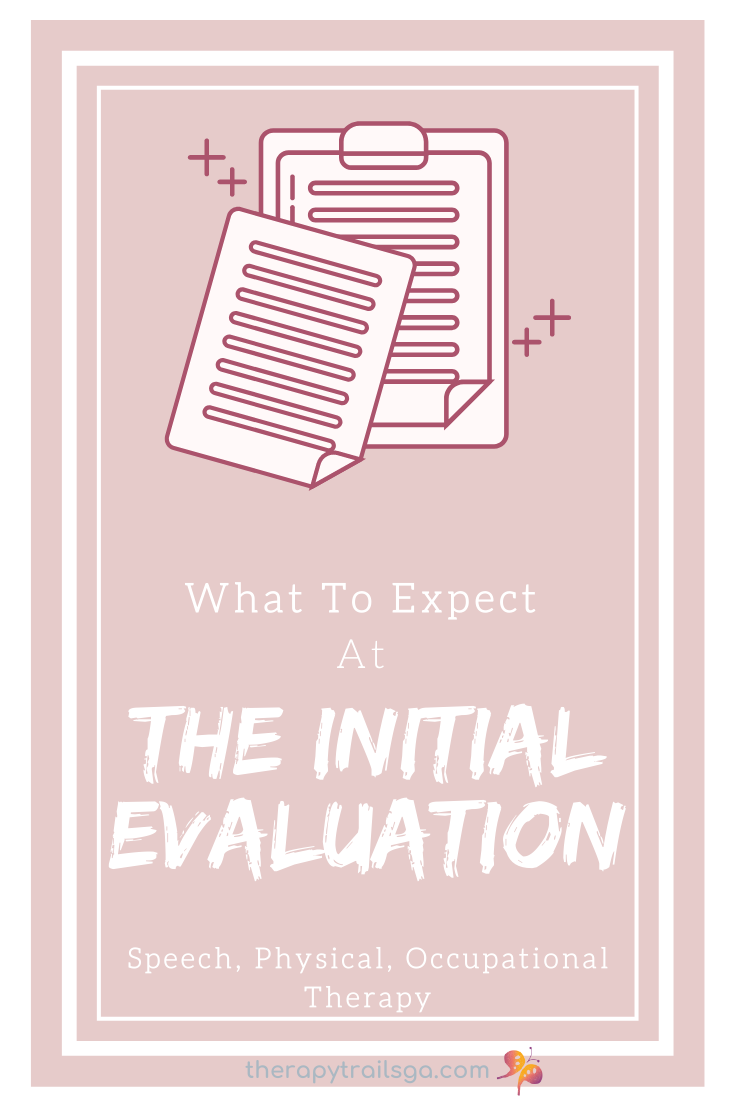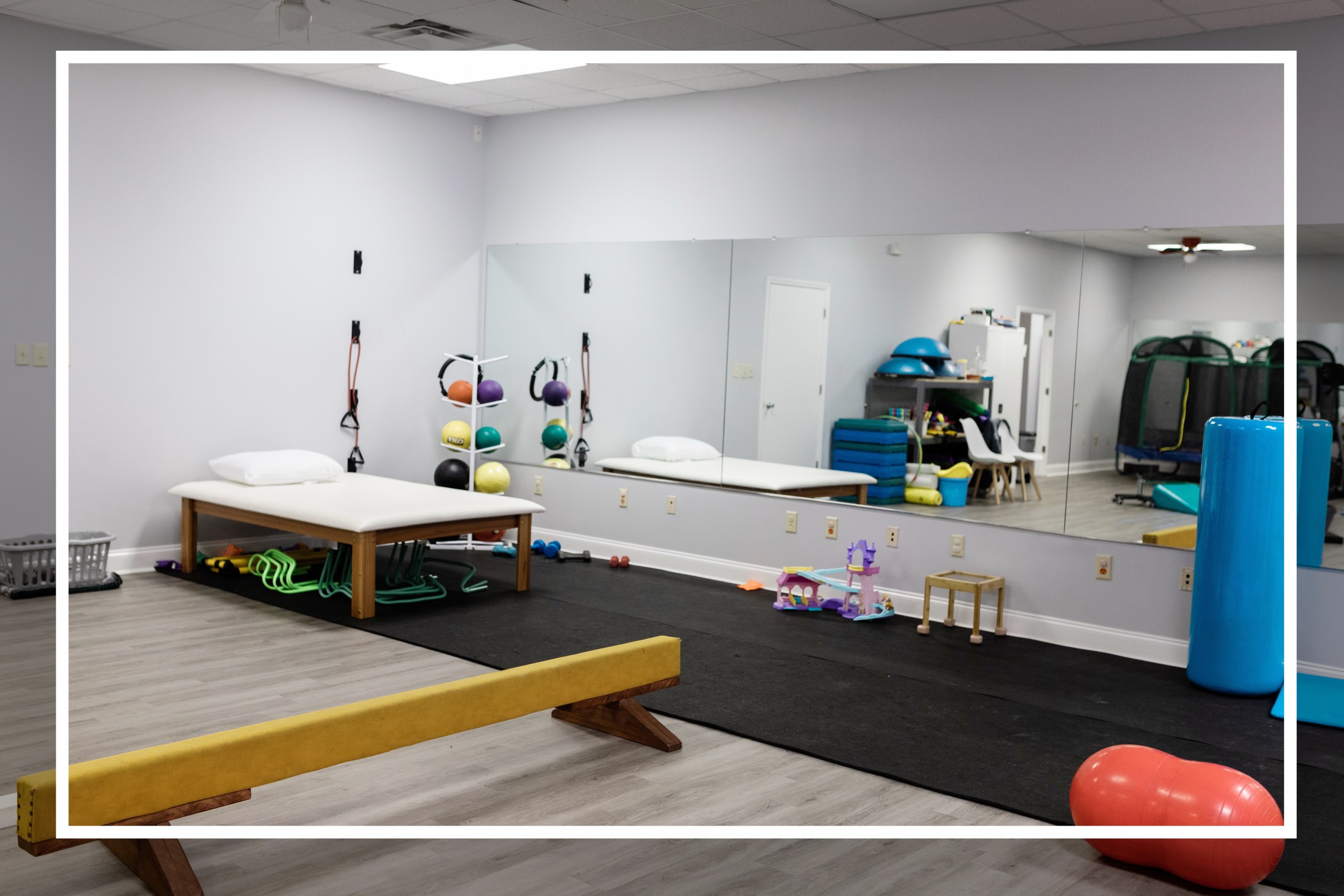What to Expect at an Initial Eval?
 Your child has been referred for speech, physical, occupational, or feeding therapy. Now what? What does that even mean? What will my child do? Who will my child see? And what the heck is “speech/physical/occupational/feeding therapy” anyway?
Your child has been referred for speech, physical, occupational, or feeding therapy. Now what? What does that even mean? What will my child do? Who will my child see? And what the heck is “speech/physical/occupational/feeding therapy” anyway?
To make the fuzziness a little less fuzzy, here is an attempt at answering some of those questions. Now is probably not a good time to say that every part of the evaluation cannot be predicted. But I’m up for the challenge!
Oh, and while we’re talking about a challenge, speech, physical, occupational, and feeding therapy are all so different, that each of these evaluations are will still not look the same. But here are some general similarities that you can expect to see regardless of what therapy you’re there for.
For more specifics on each therapy, check out these links:
Paperwork
Is there anything more boring sounding than the word “paperwork”? I have a subtle grimace just at the mention of it. Surely, I am not the only one that feels that way. Right? Are you with me on this?? Before you’re persuaded to walk away now. Hold on! Let me try and convince you otherwise.
So instead of PAPERWORK, let’s agree to call this step INTAKE.
At Therapy Trails, we have tried to make the paperwork process as quick, easy, short, and convenient as possible. Keywords: as possible! As with any medical appointment, there is certain information that is needed and can’t be avoided. With that being said, here are some critical pieces of information that we will need at intake:
- Patient demographic information
- Parent/Guardian contact information
- Insurance and policy numbers
- Clinic policies and permissions (including attendance policy)
- Consent for services
- Patient’s past medical information and developmental milestones
- Previous diagnoses, evaluations, or therapies
While some of this information is for the purpose of business protocols and procedures, a lot of it provides valuable information to the evaluation and treatment planning process. That means it’s very important that you provide us with as much information as possible.
So, are you ready for the good news? After you complete this information on your first visit, you will not have to do until again, unless the information changes.
And the even better news?? At Therapy Trails, you are able to complete this information digitally, so no printing or writing is required.
Meet-And-Greet
It’s the day of the evaluation! Finally! In a perfect world, you would have completed all of your paperwork prior to the appointment. That means that the office and therapist is armed and ready with the information before you even walk through the door.
But we all know that we don’t live in a perfect world. And if you haven’t filled out the paperwork yet, we still got your back! Just arrive 15 minutes before the scheduled appointment, and this will give you plenty of time to complete it.
Before meeting the therapist, you will check-in with the front office staff. They will let you know what information is needed, such as paperwork, copays, insurance cards, and whatever else is needed for your child’s chart.
Next up is the therapist. They have reviewed your paperwork and are ready to play with you… or with your kid! The therapist will still have some questions to ask you in person. These questions will help guide what test they will give to your child and where to focus their attention for the duration of the evaluation.
Play, Play, Test!
Now it’s the kid’s turn to do some of the work. But to you, or even the child, it may not even look like work! Toys and games may be given to the child. The therapist will watch how the child plays by himself, but also how he plays with others. Even though toys and games are involved, the child is giving the therapist lots of information about how he responds, moves, and handles instructions. This informal play can be so valuable as it provides insight into the child’s skills.
And just in case you don’t believe me, take it from Albert Einstein:
“Play is the highest form of research.” – Albert Einstein
The “Official” Test
If there is anything worse than the idea of paperwork, then it would definitely be the idea of testing. No matter what you do or how old you are, you will have to take some sort of test for some sort of reason. And pediatric therapy is no exception!
Testing provides us with scores and numbers that compares us to everyone else that has taken that test. It also gives us a general idea as to what we know, andddd what we don’t know. (But who wants to be reminded of this, right??)
Each type of therapy will have different tests that they could administer. The therapist decides which test to give based on the deficits you have reported in your intake paperwork and during the first few minutes of being in the evaluation. These tests can be as structured as a paper-pencil assessment, to naming pictures, to doing jumping jacks, and everything in between!
Chit-Chat & Future Planning
After all of this is said and done, the therapist will give you a quick gut-check as to what deficits they see and what goals may be appropriate to target going forward. The therapist will also make sure that the goals you have for your child are made known and incorporated into the plan.
Using ALL this information… including the intake paperwork, parent interview, play observation, and formal testing… the therapist will develop a plan going forward. The lengthy results and interpretation of the evaluation will be typed out into a formal report after the appointment. Some of the decisions that need to be made include:
+ If therapy is necessary
+ What skills are absent
+ What skills are present
+ What goals would be a good place to start
+ How often an appointment is recommended per week
+ How many minutes each session should be
+ If other referrals or professional services are also recommended
All of this information will be put in a nice, neat report to hand over to the pediatrician, parent, or anyone who may request it.
See?! The time you put into the initial paperwork process does not go to waste! It’s worth it in the end.
Schedule Appointment & Check Out
Last, but certainly not least, you will finally get the answer to your question: “Now what?” Depending on the therapist’s recommendations and if your child will need follow up appointments, the day and time of appointments will be discussed with our scheduling coordinator at the front desk. Because most of the therapists are already operating on full schedules, it may be a little tough to find the exact day and time you are requesting for an appointment. However, we will get it as perfect as we can for you!
Now is probably a good time to put in the disclaimer that some insurances require prior authorization before a follow up appointment can be scheduled. This is just a fancy way of saying that future therapy sessions will need to be approved by insurance, guaranteeing that they will pay for the service. Some times this authorization process is not as quick as we would like it to be because of all the moving parts (…sending evaluation to doctor … getting it signed and returned… sending to insurance … getting additional documents and reports needed …). Typically, we ask patients requiring prior authorization to give us two weeks before we schedule a follow up appointment.
And That’s a Wrap!
Whew! You and your child just completed an initial evaluation! Would you believe me if I said that the fun is only beginning?! Seriously! The appointments that follow the evaluation seem less formal and more interactive, because toys, games, obstacle courses, crafts, etc. are involved. Yes, work will be done, and goals will be targeted, but we love any excuse to make it fun.
We look forward to seeing you!



